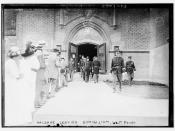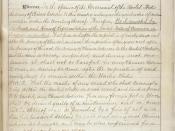The American West is an extremely ethnically diverse region. Large populations of immigrants and natives to it have established an Anglo, western population that continues to feel confined culturally and, more importantly, racially. Racial diversity may exist in the West, but inclusion is not intrinsic of diversity. Anglo westerners have worked to forge an identity void of other races existing in the West for centuries. Exclusion of Indians, Mexicans, blacks, and Asians took place in the West's short history as an effort by whites to preserve their Anglo-western identity.
By the 1860's it was clear that Anglo westerners had solidified their intentions to separate their white society from that of the Indians. The so-called "Western Civil War of Incorporation" illustrates perfectly the attempt by whites to establish their own identity by repressing others. This "War" consisted of rebellious Indians who were tired of the "political pressure and military force that concentrated them in reservations."
(Milner, 396) Reservation sovereignty had been threatened from the beginning. Treaties with Indians to allow temporary, safe passage of western migrants during the Gold Rush of the 1850's and 60's were continually violated. Migrants routinely remained in regions that they at first intended to cross, ultimately intruding on rightfully Indian land. In 1874, gold was found in the Black Hills of South Dakota. The fact that the discovering miners were on the Lakota Indian reservation, established by the Treaty of 1868, provides a clear picture of the loosely enforced and loosely followed reservation laws. But the real affront came with a government-sanctioned commission that forced the Lakota to give temporary mining rights to whites in the region. Temporary soon became permanent, and the Lakota were systematically pushed out of a region that was legally their own. The mindset of the commission toward the Lakota was evident:...


